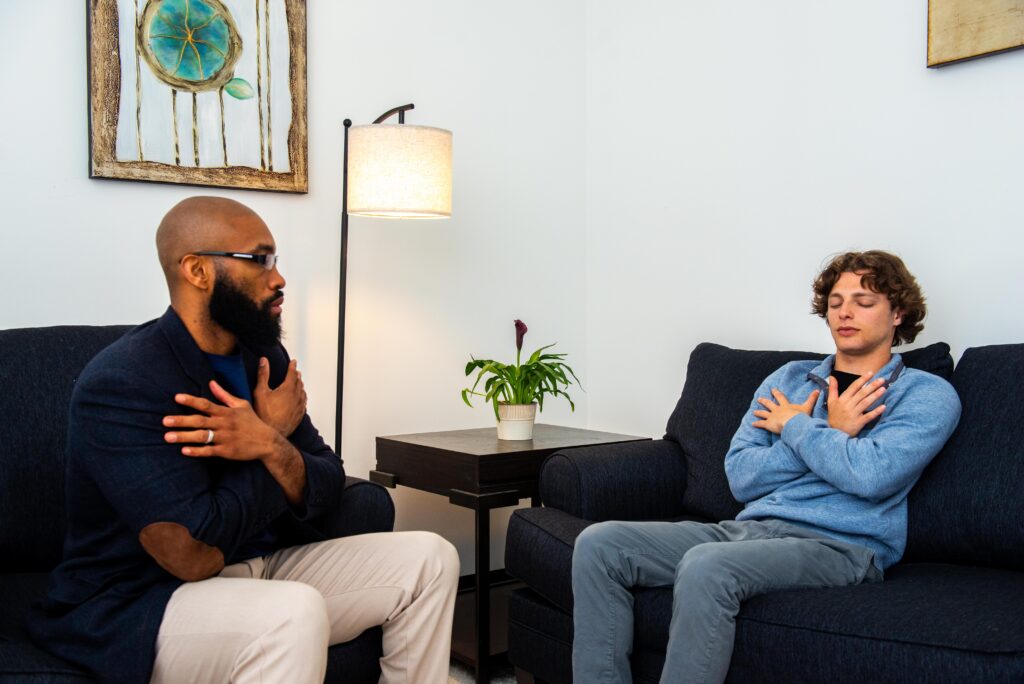Mental Health Residential Treatment FAQ
Seeking help for mental health issues can be a daunting process, especially when considering residential care. With so much information out there, it can be challenging to find clear and concise answers to questions you may have. In this blog, we’ll address some of the most frequently asked questions (FAQs) and general questions about mental health treatment and residential care, to help you find the information you need.
FAQ: What is Residential Mental Health Treatment?
Residential mental health treatment involves living at a facility while receiving comprehensive mental health care. Unlike outpatient services where you can return home after treatment sessions, residential care provides a stable environment focused on intensive therapy and support. It’s designed for individuals who require more support than outpatient care can offer, providing 24-hour supervision and a structured setting conducive to recovery. Learn more about PHP therapy vs. IOP and how they compare to residential care.
FAQ: Who Needs Residential Care?
Residential mental health care serves as a critical lifeline for individuals facing severe mental health challenges that cannot be adequately managed in a less restrictive environment. This includes people with persistent mental illnesses, such as schizophrenia, severe depression, bipolar disorder, and those experiencing acute crises that pose a risk to themselves or others.
It’s also beneficial for patients requiring close monitoring and adjustments in medication, or those who need intensive therapy and support to effect meaningful changes in their behavior and coping strategies. Essentially, residential care provides a structured, supportive environment where individuals can focus solely on recovery, away from the stresses and triggers of their everyday lives.
FAQ: What Type of Treatments are Offered?
Residential mental health facilities, such as The Meadowglade offer a variety of treatments tailored to individual needs, including but not limited to:
- Psychotherapy: Also known as talk therapy, psychotherapy explores your thoughts, feelings, and behaviors to improve your mental health.
- Evidence-Based Modalities: Newer therapy modalities such as Cognitive Behavioral Therapy (CBT), Dialectical Behavioral Therapy (DBT), Eye Movement Desensitization and Reprocessing (EMDR) can offer a different way of healing. These modalities are tailored to mental health issues that are triggered by trauma, stress, depression and so much more.
- Medication Management: Psychiatrists may prescribe medication to manage symptoms, monitored closely for effectiveness and side effects.
- Group Therapy: Group sessions create an environment for exchanging stories and gaining insights from peers dealing with similar struggles. They are a crucial component of any residential program. Participating in group therapies presents a unique form of support and conversation, different from traditional individual therapy or informal support groups.
- Holistic Therapies: Many treatment centers incorporate holistic therapies like yoga, meditation, art therapy, and exercise programs to support overall well-being.

FAQ: How Long Does Residential Treatment Last?
The duration of residential mental health treatment programs vary, depending on the individual’s specific needs and progress. Generally, stays can range from a few weeks to several months. Treatment plans are regularly assessed and adjusted as necessary to ensure the best outcomes.
FAQ: Is Residential Mental Health Treatment Effective?
Yes, residential treatment can be highly effective for those committed to the process. The immersive environment allows for a focus on healing without any distractions and stressors. Additionally, the constant support from mental health professionals and peers creates a supportive community that fosters recovery.
FAQ: Can I Maintain Contact with Family and Friends?
Residential treatment centers understand the importance of maintaining relationships with loved ones. Contact policies vary by center, but many encourage communication through phone calls, visits, and even family therapy sessions to support the patient’s recovery process.
At The Meadowglade, we understand that the state of certain relationships can be complex upon entering treatment. That’s why we provide therapy sessions that include family, friends, partners, and any others within your support network. For those times when you require additional support to navigate a difficult conversation or tackle a challenging issue, a program of this nature can be immensely beneficial.
FAQ: How Do I Choose the Right Facility?
Choosing the right facility is crucial. Consider factors such as the types of mental health issues they specialize in treating, the therapies and services offered, staff qualifications, the environment of the facility, and past patient experiences. Researching and visiting potential treatment centers can help make an informed decision. It’s also important to evaluate the facility’s approach to treatment, whether it aligns with the patient’s needs and preferences.
Additionally, understanding the level of family involvement allowed and the aftercare support provided can be vital in ensuring a comprehensive and effective treatment plan. Engaging in discussions with healthcare professionals and support groups to gather recommendations and insights can further aid in selecting a facility that best suits the individual’s needs.
FAQ: What Steps to Take Following Residential Treatment?
After completing residential treatment, it’s essential to continue with aftercare support. This could include transitioning to a lower level of care, such as outpatient therapy, partial hospitalization, or support groups. It’s also important to follow any medication and self-care routines recommended by the treatment team. Continuing therapy and incorporating healthy coping strategies learned during residential treatment can help maintain progress.
Family involvement and support can also play a significant role in the individual’s recovery journey. Following up with mental health professionals, adhering to treatment plans, and reaching out for support when needed are vital steps in maintaining long-term mental wellness.
Overall, it’s essential to have a plan in place for ongoing care and support after residential treatment ends to ensure sustained progress towards recovery.
FAQ: How Do I Choose the Right Facility?
Choosing the right facility is crucial. Consider factors such as the types of mental health issues they specialize in treating, the therapies and services offered, staff qualifications, the environment of the facility, and past patient experiences. Researching and visiting potential facilities can help make an informed decision.
Seeking help is a brave step toward recovery and understanding the process of mental health treatment, especially residential care, can ease some of the anxieties associated with this choice. By addressing these general questions, we hope to have provided valuable insights into your journey towards better mental health. Remember, the path to recovery is a personal one, and finding the right support can make all the difference in your life.

